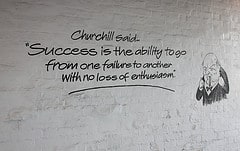How you think about and adapt to adversity in your solo law practice will play a material role in your ultimate success or failure.
Ever wonder why an attorney with legal skills that are not as good as yours, and who has half your smarts, has a solo law practice that eclipses yours, even on your best month? How that attorney perceives and reacts to adversity (and success) may be the explanation.
Those of us who take on the challenge of self-employed law practice, particularly those in the solo law practice camp, are bound to experience extreme highs and extreme lows, both personally and professionally.
It comes with the territory: With the privilege of professional freedom and limitless opportunity that self-employment affords, also comes 100% of the responsibility for your ultimate success or failure.
Your internal thoughts about adversity will dictate your level of success.
According to a recent article in Above the Law, how you perceive adversity, and success for that matter, will play a meaningful role in your level of success.

Keith Lee, the author of the article, shared a way of thinking about personal accountability in the form of a ladder. At the bottom “rungs,” you have people who constantly blame others or claim that “they can’t” get something done.
Basically, the bottom half of this ladder is reserved for those who fool themselves into thinking that they have no responsibility for the things that happen to them. Things happen to people on the bottom rungs of the ladder.
These people are poor performers in the workplace. Because they choose not to take accountability, they don’t provide solutions and deliver lower quality work in general. In fact, many people who find themselves at the bottom of the ladder don’t even realize that personal accountability is one of the most important factors for success.
On the other hand, people who take full responsibility for their actions are at the top of the ladder. These kinds of people embrace the circumstances, find solutions, and enable progress through their actions. They understand that it’s not about what you are given: it’s about what you do with what you are given.
Solos are rarely bottom-rung dwellers, but struggle with being top rung players.
In my experience, few self-employed attorneys fall in the lowest rung. It’s challenging enough to even get to the point in a professional career to consider solo practice, and it would be impossible to get to this point hanging out on the bottom rung of the ladder.
But from personal experience, and depending on the situation, I have not always approached every challenge in my law practice as a “top rung” businessperson. I have witnessed the same from time-to-time among my peers in Law Firm Suites’ NYC shared law office space. Rarely are these attorneys bottom-rung players, but many may flirt with the lower half of the “ladder.”
Want success? Get out of your own way.

Part of this is being able to manage the self-defeating attitudes of the bottom-rung dwellers that get in the way of success.
In the ATL article, the author recommends managing yourself just like you would a business, including asking yourself these three tough questions as a starting point.
-“Who am I really? Am I someone who is going to coast along or claw my way ahead?”
-“What are my core values? Not the ones I give lip service but the ones that are actually expressed in private moments? Are they actually expressed in my work?”
-“Where do I feel as though I belong? Where do I not belong?”
The important concept here is taking a sense of ownership. By taking ownership of something, you assume the responsibility of caring for it. No one else is responsible for your success. That is something that depends solely on you. Any problems in your career that arise are up to you to solve. Think about Buffett’s quote about getting out of our own way.
Success depends on the person achieving it, not circumstances around it.

Success doesn’t depend on the circumstances; it depends on the person.
If you find yourself struggling through a tough time in your professional or even personal life, examine how you played a role in this situation, how you can find creative ways to solve the problem, and what you can learn from it so you are less likely to face this challenge again.
Most importantly, don’t blame anyone else for your problems like a bottom-rung dweller.


